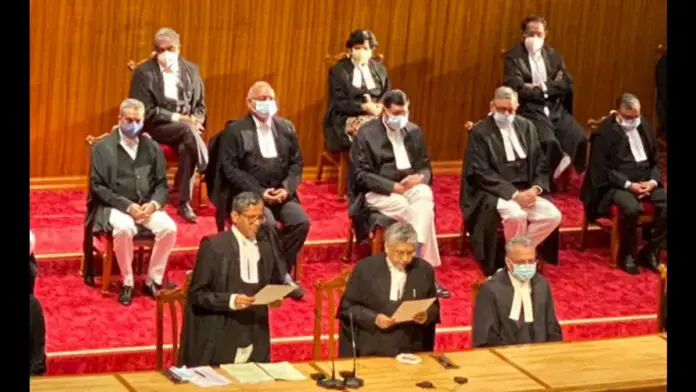
On Tuesday, nine new Supreme Court judges were administered oaths as judges, including three women, bringing the total number of judges to 33, including the CJI, out of the sanctioned strength of 34.
Nine judges took their oaths of office at once for the first time in the Supreme Court’s history. The freshly sworn-in justices were sworn in by Chief Justice of India NV Ramana.
The nine new judges who will take the oath of office as apex court judges are:
Justice A.S Oka
Justice Abhay Shreeniwas Oka was sworn in as Chief Justice of the Karnataka High Court on May 10, 2019.. He was born on the 25th of May, 1960. He earned his bachelor’s degree in science and his master’s degree in law from the University of Bombay. Bombay is the home of the High Court. He has until May 25, 2025, to serve on the Supreme Court.
Justice Vikram Nath
Justice Vikram Nath, the Chief Justice of the Gujarat High Court, has been promoted. He is in a position to become India’s Chief Justice for around seven months in 2027. He began his legal career on March 30, 1987. He worked as an attorney at the Allahabad High Court. The punitive provisions of the Gujarat Freedom of Religion (Amendment) Act, 2021 would not apply to couples who participate in inter-religious marriages of their own free will, according to Justice Nath’s Bench. In circumstances of preventive detention, he has advocated for personal liberty.
Justice JK Maheshwari
Justice JK Maheshwari, the Chief Justice of the Sikkim High Court, has been promoted. He was previously the Chief Justice of the High Court of Andhra Pradesh. Madhya Pradesh is his home state’s High Court. He will serve on the Supreme Court until June 29, 2026. He is an Arts graduate who went on to Jiwaji University in Gwalior for his post-graduation in law. In Madhya Pradesh, he pursued a PhD in the field of medical negligence.
Justice Hima Kohli
The Chief Justice of the Telangana High Court was Justice Hima Kohli. Just two days before she was set to retire, Justice Kohli was sworn in as a Supreme Court justice. In 2006, Justice Kohli was appointed to the Delhi High Court Bench. She graduated from the University of Delhi’s Law Faculty and Campus Law Centre. In 1984, she was admitted to the Delhi Bar Council as an attorney.
Justice B.V. Nagarathna
Before being appointed to the Supreme Court, Justice B.V. Nagarathna served as a judge on the Karnataka High Court. She received her undergraduate degree from Delhi University’s Jesus and Mary College and her law degree from the Campus Law Center in New Delhi. Justice Nagarathna began her legal career in 1987 at KESVY and Co., where she was mentored by Senior Advocate G.V. Shantharaju and Barrister Vasudev Reddy. KESVY and Co.
Justice C.T. Ravikumar
Before being elevated to the Supreme Court, Justice C.T. Ravikumar served as a judge on the Kerala High Court. Justice Ravikumar’s path to the Supreme Court began modestly. His father worked as a clerk in a Magistrate’s court. Justice Ravikumar graduated from the Government Law College in Kozhikode, Kerala, with a law degree.
Justice M. Sundresh,
Justice Justice MM Sundresh of the Madras High Court has been promoted. On March 3, 2009, he was appointed as an Additional Judge of the Madras High Court, and on March 29, 2011, he was appointed as a permanent Judge of the Madras High Court. He will serve on the Supreme Court until July 21, 2027. He studied law at Madras Law College after graduating from Loyola College in Chennai.
Justice Bela M. Trivedi
Justice Bela M. Trivedi is the first woman to be elevated to the Supreme Court from the Gujarat High Court. She is one of only nine new justices who has served as a Civil and Sessions Judge in the lower courts. Another woman Supreme Court judge, Justice (now retired) R. Banumathi, had the same trial judge experience as her and confirmed the death penalty for the Nirbhaya prisoners before her. In 2011, Justice Trivedi was appointed to the Gujarat High Court Bench. She served as an Additional Judge in the High Courts of Gujarat and Rajasthan.
Senior Advocate P.S. Narasimha
Justice PS Narasimha is a direct ascent from the top of the bar. From May 2014 to December 2018, he served as India’s Additional Solicitor General. He is a designated Senior Advocate. He defended the government in high-profile trials such as the Italian Marines case, the constitutional legitimacy of criminal defamation, and the NJAC Judge Appointment Case. He was previously designated as a mediator by the Supreme Court to settle disputes relating to the administration of the Board of Control for Cricket in India (BCCI). He had previously represented several of the parties in the Ayodhya dispute.








